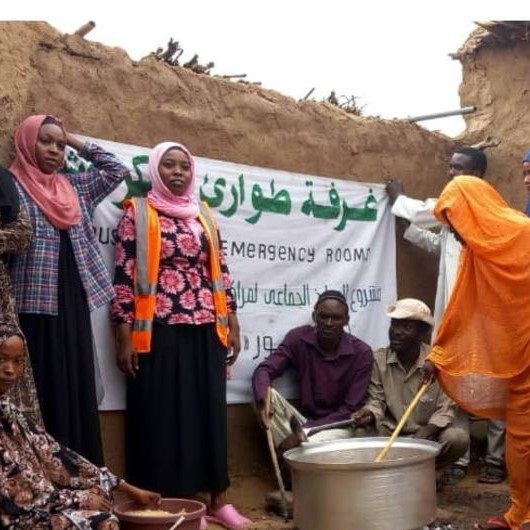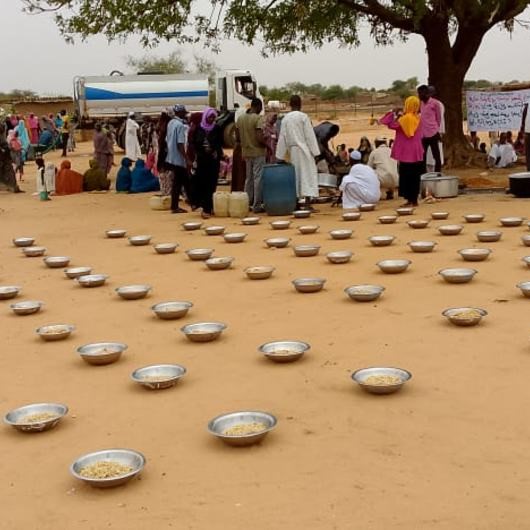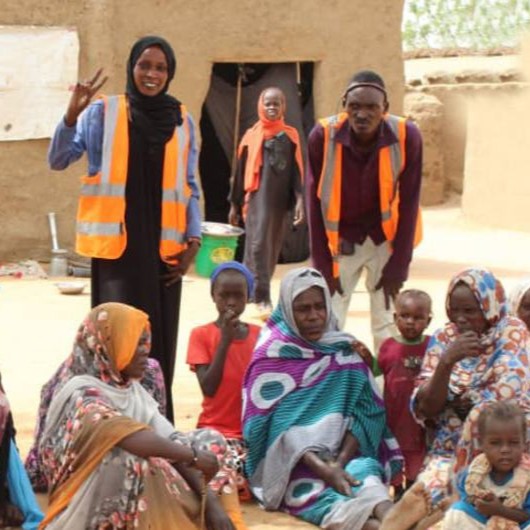All images credit: UN.
30 Aug 2024 — Young Sudanese citizens are leading the response to the famine caused by the ongoing civil war in the country. The volunteers are operating out of emergency response rooms supported by the UN to provide lifesaving nutrition to the more than half a million refugees in the North Darfur region of the East African nation.
“The emergency rooms are born from the womb of suffering and became a link between organizations and the needy on the ground,” says Mubarak Mohamed Idris, a member of the youth-led initiative at the Zamzam camp.
While international organizations struggle to gain access to the regions of Sudan most affected by the war, young local residents are playing an essential role in ensuring the UN’s continued support for those affected by acute food insecurity. This support includes lifesaving food, water, medicine and shelter.
At the start of this month, the UN announced that the Zamzam camp is experiencing a famine, with the nearby Abu Shouk and Al-Salam camps at threat of facing similar conditions, partially triggered by road closures due to the armed conflict.
“Children spend their entire day without any food at all,” says Idris, adding that families go many days without lighting a fire because they have nothing to cook. “The camp is besieged, and families have nothing.”
Fighting famine in Zamzam
Zamzam, North Darfur, is estimated to shelter at least half a million people, making it one of the largest refugee camps in the Sahel country.

The work of local volunteers are vital to tackling famine in the regions of Sudan most affected by war.The refugee camps in the area are surrounded by the Sudanese government’s RSF (Rapid Support Forces), which is battling against the SAF (Sudanese Armed Forces). Speaking to Nutrition Insight, the UN’s WFP (World Food Programme) called on local leaders to ensure the safe transit of food and essentials as fighting continues.
“The main drivers of famine in the Zamzam camp are conflict and lack of humanitarian access, both of which can immediately be rectified with the necessary political will,” states a report by the IPC (Integrated Food Security Phase Classification).
A spokesperson for the humanitarian organization CARE, told us that women and girls are among those most vulnerable to food insecurity amid the conflict in Sudan.
While political solutions are yet to be found, young Sudanese based in Zamzam are taking matters into their own hands and establishing community kitchens to fight food insecurity.
At the community kitchens, volunteers prepare and distribute food to more than 46 shelters around the Zamzam camp while also promoting solidarity and cooperation.
Idris says: “This helps us alleviate the suffering of the displaced inside the camp due to the lack of food and the inability of families to feed themselves.”
Access to necessities
The community is further struggling to access safe drinking water, as the wells at the camp are out of service due to the lack of fuel, which is also caused by road blockades.
“Now, only two of the eight water wells in the camp are operating,” explains Idris. “We struggle to bring water to the camp in light of the clashes and artillery shelling and lack of funding. We bring two water carts with 200 barrels of water and distribute them to people in 46 centers, but that’s not enough.”
The volunteers are also working to provide waterproof tarpaulins and other shelter supplies, insecticide spraying tools, mosquito nets and clothing for the children.
The worsening situation in nearby camps
The Abu Shouk refugee camp, 22 km from Zamzam and also surrounded by the RSF, is facing many of the same issues, albeit not yet to the same extent.

Local volunteers call on international partners to provide steady support to ensure the food security of displaced children.Mohamed Adam Abdel Latif, a representative of the media committee of the emergency room serving the community, comments: “All signs of famine are very clear,” he says adding there have been “a lot of deaths” due to hunger, especially among children.
Amid the rainy season in Sudan, recent floods destroyed more than 700 homes in Abu Schouk. The key ongoing challenge in this camp is also the shortage of food and other lifesaving supplies.
The on-site health centers were “shuttered” following artillery shelling, apart from one providing primary care, which is currently facing “a severe shortage of medicines and medical supplies, especially for children under age five.”
Latif stresses: “We don’t have access to therapeutic nutrition. We have two therapeutic feeding centers, and they were bombed by the RSF.”
The on-the-ground volunteers report that the food-system disruptions have forced many people to eat animal feed. They are seeing cases of people resorting to begging or prostitution to be able to feed their children.
“We provide food to shelters that are now completely dependent on us,” says Latif.
He expresses his gratitude for the support his team is receiving from NGOs, such as UN partner the Norwegian Refugee Council, which provided US$5,000 to the community kitchen.
However, Larif also notes a lack of steady support, which has now forced the camp kitchen to shut down for 20 days.
“We have appealed many times, and we continue to appeal to international and UN organizations to provide services to us in any way. We appeal to the UN authorities to coordinate with the bodies inside the camp in order to deliver support to displaced children and their families,” Larif states.
By Milana Nikolova

